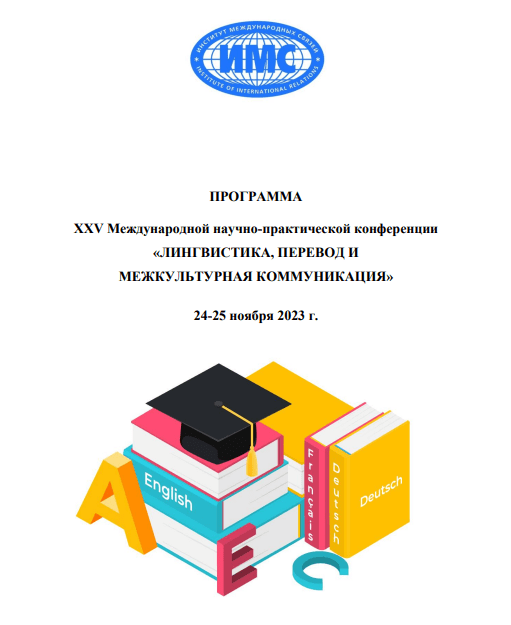Reflection on the XXV conference “Linguistics, Translation and International Communication” by Olga Sokolova
 On November 25, 2023, I took part in the XXV conference “Linguistics, Translation and International Communication” at the Institute of International Relations in my hometown of Yekaterinburg, Russia. It was an on-line participation. The Institute of International Relations is a private institute that trains linguists, translators, and specialists in the field of international economic relations, tourism, hotel services and public relations. The conference was attended by teachers, translators and researchers from Russia, USA, UK and also the students of the Institute of International Relations.
On November 25, 2023, I took part in the XXV conference “Linguistics, Translation and International Communication” at the Institute of International Relations in my hometown of Yekaterinburg, Russia. It was an on-line participation. The Institute of International Relations is a private institute that trains linguists, translators, and specialists in the field of international economic relations, tourism, hotel services and public relations. The conference was attended by teachers, translators and researchers from Russia, USA, UK and also the students of the Institute of International Relations.
I didn’t have the opportunity to follow the entire program, but I’m still in contact with my colleagues . Professor Yulia Bogoyavlenskaya from Ural Federal University and professor Elena Kagan from the Institute of International Relations focused on ontological problems like the prospects and future of the profession of translators and teachers and of humanity in general in the world increasingly influenced by AI. Professor Evgeniya Romanova, professor Liliya Zelenina from Ural State Pedagogical University presented some technics using AI in teaching and translation. Jakob Lake from the United States and Jonathan Errington from the United Kingdom represented their language schools “Time to study” and spoke about the use of psychological techniques and mnemonics in language learning.
There were also presentations devoted to particular aspects of translation such as the localization of foreign company sites, the translation of influencers’ blogs, in the field of contemporary dance, psychoanalysis and even yoga! Most of the speakers therefore discussed purely linguistic problems, while my theme also touched on the field of international communication.
I gave a presentation in Russian, the topic was “Assimilation of French borrowed words in Turkish language”. I briefly talked about the history of relations between Turkey and France, about the role of the French language in Turkey. Then I introduced some groups of French borrowed words in Turkish. In my presentation, I focused on the linguistic aspects of borrowed words, their semantic, phonetic, graphic and grammatical modifications.
The questions I was asked were on the side of intercultural communication and the realities of university life in Turkey. Which proves that Russian people often have a stereotypical vision of Turkey but they are at the same time open-minded and curious to establish relationships and learn about other cultures. I am happy to have had the opportunity to deconstruct some clichés and present Turkey as a country with a very powerful university tradition, including, of course, Ozyegin University. From a linguistic point of view, we have understood that despite all the diversity and richness of languages, there are many universal linguistic laws.
The collection of materials from this conference will be published in 2024 in Yekaterinburg, Russia.

Leave a Reply